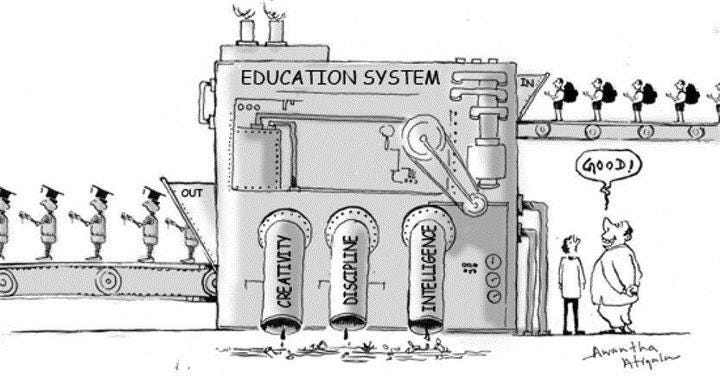
It (Education) is headed towards a crisis of sorts, where it simply no longer works for the vast majority of middle-class students who are amassing large amounts of debt going to college — Peter Thiel

Imagine you arrive home and your kitchen sink is overflowing. The tap is running and there is a mop leaning against the countertop. You pick up the mop and start mopping furiously, but don’t seem to be making any progress. Perhaps the better option is to turn off the tap and then start mopping?
So many of us are “mopping” in our lives and in our businesses. This happens at every level of society. It is always easier to be busy doing stuff than question why we are doing it.
Questionable Leadership?
The world is changing at a rapid pace. A mere 12% of Fortune 500 companies in 1955 were still on the list in 2016. The other 88% have either gone bankrupt or were merged or acquired. Many of the companies on the list in 1955 are victims of irrelevance, “me-too propositions”, disruption (through digitization or otherwise) and poor leadership.
Leadership in many companies is “the same”. The same in the way it is conducted, the same in the way it is incentivised and the same in the way it is mentally charged. Leaders are often surrounded by yes people, who don’t respectfully challenge the leader’s decisions.
It is easy to point to leadership as the problem, this is akin to mopping the floor. We need to investigate the source of these leadership problems.
The Source(s) of the Problem(s)
Tiger Parenting, Generation Snowflake, Doxa and the Education
Tiger Parenting is a term that came to prominence after the publication of Amy Chua’s ‘Battle Hymn of the Tiger Mother’. The term describes parents who rule the household in an authoritarian way. These parents are focused on the education of their children and the high grades that their children must achieve. Some of these parents deprive their children of unstructured play and many of childhoods opportunities to explore.
Generation Snowflake, or Snowflake Generation, is the term for young adults of today. This generation easily takes offence to any criticism and is considered much less resilient than previous generations. This generation is very uncomfortable when their view or opinion is challenged.
Often because students were so “streamlined” by tiger parents and because they were not given the opportunity to “explore” the world, they arrive at college full of preconceived ideas and beliefs about the world. These beliefs are often very narrow.
Doxa is the term Plato called these opinions or notions. Doxa is a Greek word meaning common belief or popular opinion. Doxa are opinions we pick up from the world around us via our surroundings, our workplace, our family, friends, TV, Politics or whatever inputs we allow.
Plato believed that it was our duty to liberate ourselves from doxa by first recognising them and then scrutinising and criticising them. Because generation snowflake was so “sheltered” it never had the chance to experience a challenge to its beliefs, so when it does happen the snowflake melts.
Third level education is surely the ideal place for this to happen? It is a surreal place where people have time and latitude to explore themselves, the world and a wide variety of subjects, right?
The Education System

The education system is becoming increasingly corporatised. To remain viable, colleges have had to invest in state-of-the-art facilities to attract students over their competitors. Least spending goes on their most valuable resources: the teachers themselves. Teachers should be upskilled, trained and constantly reviewed to ensure they are on top of their game.
Teachers too are under pressure. They must ensure students achieve certain grades as this affects rankings and better rankings mean more students which means more revenue. Hence, this cycle of ratings and revenue becomes the goal. Teachers don’t often have time to allow students to “explore and play” and most importantly to challenge their doxa.
Another important factor is the lack of diversity (of background and thought) in top U.S. universities. When this is the case students lose the opportunity to “walk a mile the shoes” of another culture and indeed to communicate with another culture. This is often because of the prohibitive cost of higher education in countries like the USA. (It is a thing that the Irish government has got right, by democratising education.)
Why is this a Problem?
We already called out that many companies are failing or have failed, others are dead-companies walking. The leadership in these companies is failing. Why?
Many people in leadership positions are perfectly comfortable “doing” or “executing” — they have been conditioned that way. They have been conditioned to be linear thinkers and to be task orientated. They have been conditioned to work for tangible and timely rewards. They are measured on many outdated business metrics.
In the corporate world, this translates into short-term thinking, being risk averse and mistaking planning for strategy.
Before we look at solutions, let’s consider some more forces at play.
The Fourth Revolution
We are amidst a fourth industrial revolution. The signals are all around us. Artificial intelligence is no longer a thing of sci-fi movies, it is in its embryonic stages running the backstage of apps, websites and voice-controlled interfaces. Automation has been advancing steadily for decades and has replaced a lot of manual labour.
With advances in deep learning and machine learning, artificial intelligence will replace jobs in the knowledge economy of today.
The result of all this will be that many of us and especially our children will be working in jobs that don’t exist, don’t have a title nor job spec today, but they are not being educated for this imminent change.
Here is only a small sample of jobs that did not exist only ten years ago to emphasise that point: App Developer, Social media manager, Cloud computing engineer, Data scientist (in its multiple new forms) and Drone operators.
Flexibility and Resilience
My good friend and ex-teammate Gordon D’arcy wrote this article on the transition from rugby to “the real world”. In it, he calls out: “For 24 years I knew precisely what I needed to be doing, with a printed out schedule guiding me from morning to night”.
This is a great example of what is happening for our children today. By prescribing their every move, or worse by following the path of a tiger parent and deciding their every move, we deprive children of the opportunity to learn critical skills needed for tomorrow. In rugby, at least you learn to think on your feet, you (l)earn resilience, but even in rugby, you can over-prescribe every move for players on and off the pitch and this haunts them in their life after rugby.
Solutions — Turning off the Tap
Opting not to go to college and building the next tech unicorn is not the answer. In the USA adults without degrees earn about $23,900 per year. This is half the average of a college graduate. This will of course work for some, but there are not enough unicorn opportunities for everyone.
Let’s focus on how to turn off the tap. We need to look at what inputs our children are exposed to, school, sports coaches, piano lessons. We need to look at ourselves as parents, how are we conditioning our children? Are we rewarding achievement and not the effort that led to that achievement? Are we replacing books with tablets and YouTube? Are we questioning what our children are learning in school? Are we trying to shape the future of our children rather than letting them find themselves?
Programmes such as Junior Entrepreneur Programme co-founded by entrepreneur Jerry Kennelly (a future guest on The Innovation Show) become essential to equip children for tomorrow’s world.
As parents, we need to look at the soft skills our kids will need in the future. Empathy, emotional intelligence, diversity of thought all become essential. As this week’s guest on the innovation show Bill Deresiewicz calls out in his ‘Excellent Sheep’ liberal arts degrees become essential to hone skills needed for tomorrow such as critical thinking, putting yourself in other’s shoes (in a Global world) and communication in all forms.
Corporate Leadership
Leaders need to become big thinkers, diverse thinkers, critical thinkers. Stretching their thinking is only a starting point. Hiring and advancing diverse thinkers within their organisations leads to different strategies and different results.
Remember only 12% of Fortune 500 companies remain after 50 years, do you want to be the leader of a sinking ship?
Bringing in new thinking is not a sign of weakness, but a sign of strength and foresight. Boards of directors may need to be convinced, but boards may see it as a bigger weakness if the business fails.
Breaking Psychological Inertia
“They are operating in a tiny slice of the Universe” — William Deresiewicz
Psychological inertia describes our inclination to rely on familiar assumptions and exhibit a reluctance and inability to revise those assumptions. This remains the case even when the evidence supporting them no longer exists.
Organisations experience this when managers fail to update and revise their understanding of a situation even when that situation changes. This is one of the biggest barriers to organisational change and breakthrough innovation.
Even companies, who are not steeped in political wrangling nor groupthink can still fail. If they fail in spite of their genuine desire to succeed, then you have to question if they are a victim of psychological inertia?
So, if your people in the company are good at their jobs (let’s assume they are) and their strategy is failing, then we need to call out what is broken.
The first thing to question is the information that feeds strategy. The second is that these senior executives are victims of psychological inertia.
We can’t solve problems by using the same kind of thinking we used when we created them. — Albert Einstein
“Turning off the tap” will safeguard many of our future leaders and arm them with skills for tomorrow, but we need to concern ourselves with the near term.
Companies need to see their real problems and rise above the vested interest, look beyond the quarterly earnings (while still managing them) and understand real patterns, not trends, not surveys.
Leaders need to question and threaten their own psychological inertia and the doxa that surrounds them.
Leaders need to rise above the noise and adopt a high-level satellite view of their opportunity or situation and only then create a strategy that is in-flow.
We need to both mop the floor to deal with the symptoms and address the source by turning off the tap.
Thanks for reading
This week’s guest is Keynote Speaker and author of ‘Excellent Sheep’ William Deresiewicz.
EP: 57 Are we producing ‘Excellent Sheep’? The Future of Leadership, Work and Education
Bill tells us of a gaping void we have in our midst. Children are being raised to do what they think their parents want more than what they want themselves. A huge number of third level students are afraid to study what they want and instead chose subjects that are “accepted” and “expected”.
We talk how this originates in the home with “Tiger Parents”, we discuss the problems of pressure and aimlessness on the campuses and the so-called “Stanford Duck Syndrome”.
We discuss the true meaning of diversity and how corporations can harness it for the future.
We discuss the inequality of the education system and how it is no wonder that GroupThink is alive and well. Bill also informs us of how presidential candidates all follow the same path of education.
Finally, Bill offers some sound advice to break the cycle so we stop producing ‘Excellent Sheep’
The show is broadcast on RTÉ Radio 1 extra 3 times weekly and is on iTunes, TuneIn Stitcher Player FM and Google play. The website is here and below is Soundcloud.